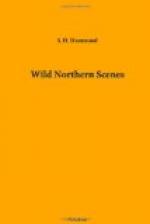On our return, and as we came in sight of the dam, I, being in the forward boat, saw a small deer, laying stretched out upon these poles, dead, hanging, as it were, by one foot. My impression was, that it had been shot, and dragged up there, and left by our pioneer for the present. We found, however, upon examination, that the deer had walked up on the dam, probably to take a look at what was below, and on the other side, when his foot slipped down between the poles, and he was caught as in a trap. His leg was badly broken, and nearly severed by his efforts to get loose, and the bark of the poles was worn away within reach of his struggles. He had died where he thus got hung; and there he was, stone dead, but not yet cold, when we found him. He was a fine, fat, young deer, and died by one of the thousand accidents to which the wild animals of the forest, as well as man, are exposed.
Upon relating this incident to an old hunter, I was told by him that he once, while out in the woods, came upon the skeletons of two large bucks, that, in fighting, had got their horns so interlocked and wedged together, that they could not separate them, and thus, locked in the death grapple, they had starved and died. There lay their bones, the flesh eaten from them by the beasts and carrion birds, and, bleached by the sun and the storms, the two skulls with the horns still interlocked; and the narrator told me he had them yet at home, fast together, as he found them, as one of the curiosities to be met with in the Rackett woods.
“I’ve been thinking,” said Spalding, in his quiet way, as we sat towards evening, looking out over the pleasant little lake, watching the shadow chasing the retiring sunlight up the sides of the opposite hills, “I’ve been thinking how differently we act, and feel, and talk—aye, and think, too—out here in these old woods, from what we do when at home and surrounded by civilization. However we four may deny being old, we cannot certainly claim to be young. We have all reached the meridian of life, and though feeling few, if any, of the infirmities of age, still, our next move will be in the downhill direction. Yet, notwithstanding all this, we talk and act, and think, and feel, too, like boys. I do not speak this reproachfully, but as a fact which develops a curious attribute of the human mind.”
“Well,” replied the Doctor, “while it may be curious, it is exceedingly natural. We have thrown off the restraints which society imposes upon us; we have thrown off the cares which the business of life heaps upon us. We have gone back for a season to the freedom, the sports, the sights, the exercises which delighted our boyhood. And can it be called strange that the feelings, the thoughts, and emotions of our youth should come welling up from the long past, or that with the return of boyish emotions, the language and actions of boyhood should be indulged in again?”
“You will find,” said Smith, “your old feelings of sobriety, of thoughtfulness, your cautiousness, coming back just in proportion as you tire of this wilderness life, and that by the time you are ready to return to civilization, you will have become as staid, sober, and reflective men of the world, as when you started, with as strict a guard upon your expression of sentiment, or opinion, as ever.”




